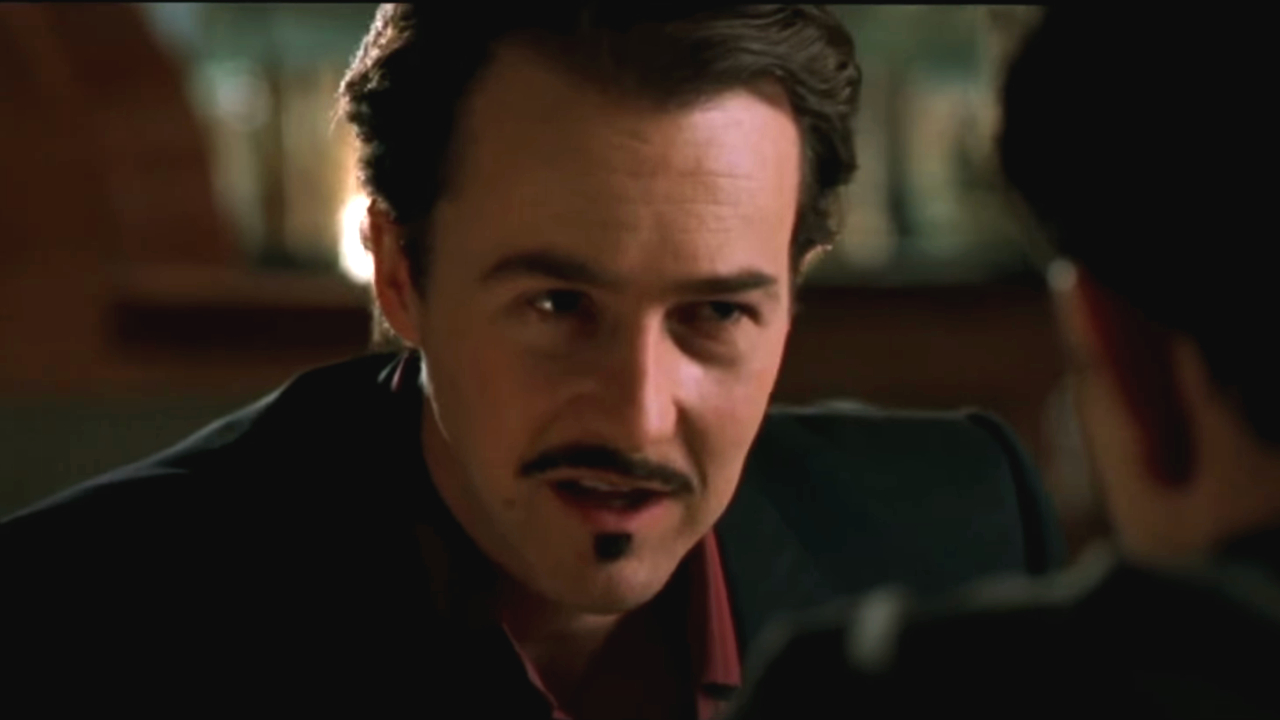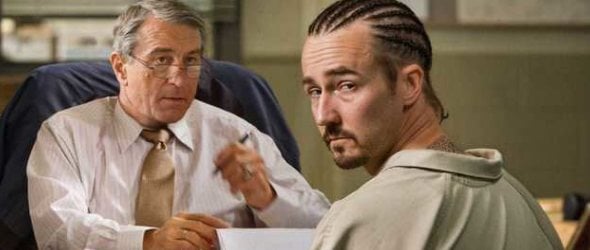TIFF Interview: Edward Norton Talks Screenwriting And Meeting Prisoners For Stone

Your Daily Blend of Entertainment News
You are now subscribed
Your newsletter sign-up was successful
There's plenty of acting talent to be found at this year's Toronto INternational Film Festival, from guaranteed Oscar-nominated performances from Nicole Kidman and Natalie Portman in Rabbit Hole and Black Swan, respectively, to actresses like Sally Hawkins showing in three different movies. But it's hard to think of a more powerful head-to-head matchup, in a long series and scenes, than Edward Norton and Robert DeNiro in Stone. With Norton playing a smug and spiritual convict and De Niro as the prison parole officer who doesn't know how to read this other guy, the two actors are facing off for the first time since 2001's The Score-- and each is even better this time around.
De Niro was sadly absent during last week's roundtable interviews for the film, but I did get a chance to talk to Norton-- and since Stone doesn't yet have a distributor, I've left out all the parts of the conversation that deal with details of film itself. Instead read below as Norton talks about basing his character on real prisoners, working on the screenplay with director John Curran, and how he's seen the movie industry change after decades in the business. Stone is still looking for distribution, but I'd expect to see it pop up in theaters within the next year.
How did you develop your character from what you saw on the page?
I looked for inspiration in some of the people I spoke to. I had the opportunity[to talk] with a lot of men who were in prison, the facility we were working in, in the weeks before the shoot. Whenever I saw a quality in someone I thought was really interesting I would have John [Curran, the film's director] come to the prison and meet the same person. It was cobbled together mostly out of meeting guys from that prison.
You did a lot with the character's physicality, and it changes throughout the film. How did you work on that?
The look of a guy like that, to be totally honest, there's so many people in prisons-- it's not that revelatory that these guys in prison are really inked up. Tons of them have shaved heads or cornrows, it's very, very common. You meet some of these guys who have been in there a long time, and they've maybe made some changes and are very thoughtful--and yet they're very intimidating presences sitting in front of you. One of the guys, he said you've got to armor up in here. I think people insulate themselves physically against that environment.
I know you made changes to the script. What kind of stuff did you add?
Your Daily Blend of Entertainment News
I thought it was a little unformed when I read it. I didn't understand what I was after. Many, many of the things in the film were not in that script originally. It was set in the South, it was much more of a plot-driven story, and I didn't quite get what John was after with it. It wasn't that I wasn't interested, I just didn't think it was there. I put him back to it, and he came back-- the more he talked about it, the more I realized he was using the script as a springboard into these much deeper issues.

Do you generally do work on the script when you take on projects?
I would say the majority of times no, but John and I worked so closely on The Painted Veil, and we just have a rhythm. Once we knew we knew we were going to do it we sat down together and worked on it for maybe six weeks. Then we rehearsed with Bob for about a month and then everyone else came.
How sensitive do you have to be going into a situation like that?
I'm never delicate about it. John is a close collaborator of mine--we're working on another thing now. He sent [the Stone script] to me saying, "What do you think about this, and I give him my response. He's just trying to grow into something better too. We trust each other a lot, and he was asking me to work on it.
How have your feelings about the industry changed since you first started? And characters' definition of redemption?
I guess if you work in the business long enough, the structure of the movie business, it ebbs and flows and changes. The film studios are going through a lot of the same things the record industry went through. Frankly, it's not been that dynamic and innovative in terms of figuring out how they're going to sell their product in new forms. They've been caught out and DVD revenues are dropping-- that makes for a slightly less freewheeling environment for creative people to come and get their movies made and get them out. You've got to be-- they're not being that innovative, but I think that means we have to be a little more innovative. As entities they may not be designed to be that innovative. To me, one side of the industry is compressing, but there will be some very exciting-- in the next 10 years, much as it has with music, I think the ability of filmmakers to form direct conversations with people who want to watch films is going to do some kind of end run around this system that's been in place for a long time.
More Cinema Blend coverage from the 2010 Toronto International Film Festival right here.
Staff Writer at CinemaBlend

